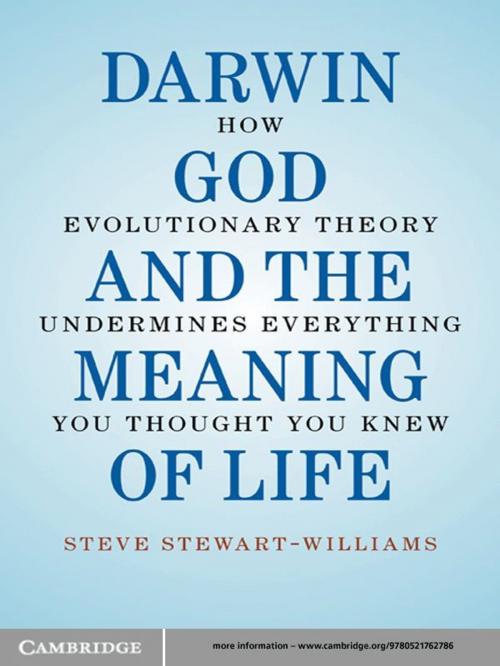Darwin, God and the Meaning of Life
How Evolutionary Theory Undermines Everything You Thought You Knew
Nonfiction, Science & Nature, Science, Other Sciences, Philosophy & Social Aspects, Health & Well Being, Psychology| Author: | Steve Stewart-Williams | ISBN: | 9780511850622 |
| Publisher: | Cambridge University Press | Publication: | September 30, 2010 |
| Imprint: | Cambridge University Press | Language: | English |
| Author: | Steve Stewart-Williams |
| ISBN: | 9780511850622 |
| Publisher: | Cambridge University Press |
| Publication: | September 30, 2010 |
| Imprint: | Cambridge University Press |
| Language: | English |
If you accept evolutionary theory, can you also believe in God? Are human beings superior to other animals, or is this just a human prejudice? Does Darwin have implications for heated issues like euthanasia and animal rights? Does evolution tell us the purpose of life, or does it imply that life has no ultimate purpose? Does evolution tell us what is morally right and wrong, or does it imply that ultimately 'nothing' is right or wrong? In this fascinating and intriguing book, Steve Stewart-Williams addresses these and other fundamental philosophical questions raised by evolutionary theory and the exciting new field of evolutionary psychology. Drawing on biology, psychology and philosophy, he argues that Darwinian science supports a view of a godless universe devoid of ultimate purpose or moral structure, but that we can still live a good life and a happy life within the confines of this view.
If you accept evolutionary theory, can you also believe in God? Are human beings superior to other animals, or is this just a human prejudice? Does Darwin have implications for heated issues like euthanasia and animal rights? Does evolution tell us the purpose of life, or does it imply that life has no ultimate purpose? Does evolution tell us what is morally right and wrong, or does it imply that ultimately 'nothing' is right or wrong? In this fascinating and intriguing book, Steve Stewart-Williams addresses these and other fundamental philosophical questions raised by evolutionary theory and the exciting new field of evolutionary psychology. Drawing on biology, psychology and philosophy, he argues that Darwinian science supports a view of a godless universe devoid of ultimate purpose or moral structure, but that we can still live a good life and a happy life within the confines of this view.















